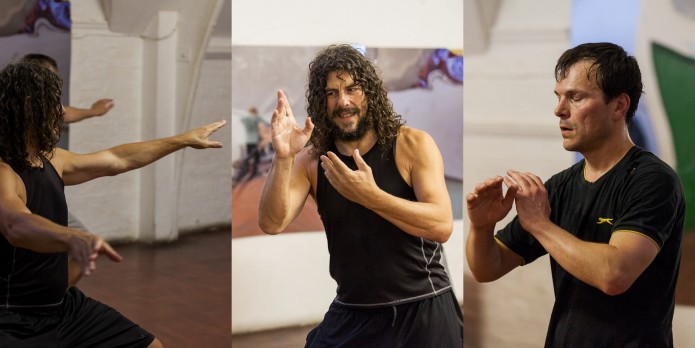The video below shows Seven Stars, Nine Castles, and Four Directions pushing hands drills.
Category Archives: Form Class

Martial Class Hand Form
After an energetic training session in our martial classes, we cool down by performing the Tai Chi hand form.
Taking 15-20 minutes to perform in total, the slow movements effectively perform the function of a therapeutic warm-down, encouraging the muscles and joints to move through their range of motion while operating at a reduced intensity. Meanwhile, one gains all the other benefits of practising the hand form – one works through an efficient template of the style’s martial movements while training balance, co-ordination and focus.
The tiredness experienced after expending energy in pushing hands practice and sparring also helps encourage relaxation and use of minimum muscular tension, which also benefits one’s practice of the form.
Below are some photos taken during a martial class (photography by Steve Musselwhite).
Weapon Forms – Sabre/Sword
When students have learned the Tai Chi Hand Form and basic Pushing Hands exercises, they may advance to learning the Weapon Forms. These forms are more dynamic, involving longer stances, lower crouching and faster movement, which can provide a different form of workout than the slower-performed Hand Form movements.
Nonetheless, the same principles learned in the Hand Form apply to the weapons forms, such as relaxation, correct alignment, softness, whole body movement and natural breathing. If errors are found in the performance of the weapons forms, these can often be traced back to errors within the performance and understanding of the Hand Form.
Martial applications exist for the individual movements of the forms and are performed in paired groups.
The video below shows a clip of moves from the sabre form:
Hand Form
 The Tai Chi Hand Form is a series of soft, deliberate, graceful and slow movements coupled with meditation and deep diaphragmatic breathing. The movements that make up the form each have names like Grasping the Bird’s Tail, Waving Hands in Clouds, Snake Creeps Down and White Crane Flaps Its Wings. Once you have learnt a form or set of moves, you can perform it every day. The gentle, yin classes are devoted mainly to learning and improving the hand form.
The Tai Chi Hand Form is a series of soft, deliberate, graceful and slow movements coupled with meditation and deep diaphragmatic breathing. The movements that make up the form each have names like Grasping the Bird’s Tail, Waving Hands in Clouds, Snake Creeps Down and White Crane Flaps Its Wings. Once you have learnt a form or set of moves, you can perform it every day. The gentle, yin classes are devoted mainly to learning and improving the hand form.
Moves in the hand form balance yin and yang so that there is separation and continual flow between yin, defending, and yang, attacking movements of the body.
To achieve balance of yin and yang, the body must move as one unit with movement directed from the waist, rather than the limbs acting in isolation. This requires supple, relaxed but strong muscles and joints, which develop naturally with regular practise. Deep breathing enhances relaxation.
The movements of the hand form have self-defence applications that can be learned in the martial classes if desired, though this is not necessary to enjoy the benefits of the hand form itself, since the movements are also, and not merely coincidentally, excellent ways of stretching, loosening and relaxing muscles and joints. Some movements are thought to involve neural stretches, which free nerves from becoming trapped. There is evidence that bone density increases with regular practise. Deep breathing massages internal organs, improving digestion and enhances the meditative process, further increasing relaxation.
Mental tension and lack of exercise can often cause bad posture and physical tension of the body, especially of the shoulders and back. Physical tension in turn increases mental stress, and eventually health problems may develop. The tai chi hand form helps release these tensions not only by the nature of the movements themselves, but also by virtue of meditation and deliberate awareness of tension in the body. Thus, not only is greater harmony of movement achieved, but also harmony of body and mind.
The ancient beliefs would explain the benefits of tai chi in terms of the chi or life force becoming centered at a point just above the navel and radiating out, resulting in harmony and balance. However, we are now in a position to explain the benefits in medical and biomechanisitic terms.
The photo album below shows clips of our students performing the Tai Chi Hand Form, both under instruction in small groups, and also together as a class.
Hand Form – University Class
Video clips and image gallery of students practising Hand Form in the University Class. As well as encoding many practical self-defence applications, and teaching martial concepts such as single-weighting, whole-body movement and balanced turning/stepping, the hand form offers many health benefits by encouraging good posture, minimal muscle tension and relaxed breathing – a great way to de-stress before Finals!